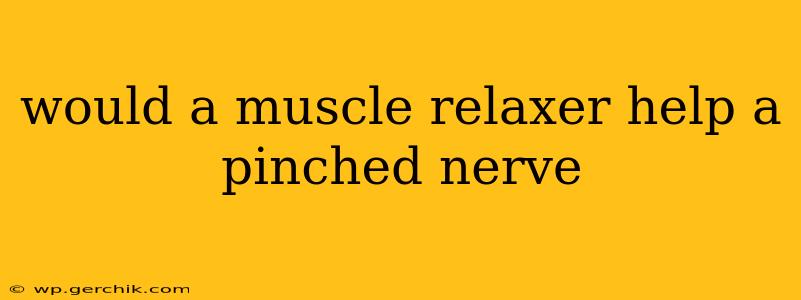Would a Muscle Relaxer Help a Pinched Nerve?
A pinched nerve, also known as a compressed nerve, occurs when surrounding tissues, such as bones, muscles, or ligaments, put pressure on a nerve. This pressure can cause pain, numbness, tingling, weakness, and other symptoms. While muscle relaxers might offer some relief, they aren't a direct treatment for the underlying cause of a pinched nerve. Understanding how they work and their limitations is crucial.
What are Muscle Relaxers?
Muscle relaxants, also called muscle relaxants, are medications prescribed to reduce muscle spasms and stiffness. They work by interfering with nerve impulses that signal muscle contraction. This can indirectly alleviate pain by reducing the tension on the affected nerve. However, it's important to remember that they don't address the root cause – the compression of the nerve itself.
How Can Muscle Relaxers Help with a Pinched Nerve?
The benefit of muscle relaxers in a pinched nerve situation is primarily indirect. If the pinched nerve is caused or exacerbated by muscle spasms or tightness surrounding the nerve, relaxing these muscles can provide temporary pain relief. For example, a pinched nerve in the neck (cervical radiculopathy) might be eased if neck muscle spasms are reduced.
What are the Limitations of Muscle Relaxers for Pinched Nerves?
Muscle relaxers are not a long-term solution for a pinched nerve. They only address the symptom (muscle spasm) and not the cause (nerve compression). Furthermore:
- They don't address the nerve compression: The underlying problem remains, potentially leading to ongoing or worsening symptoms.
- They have side effects: Muscle relaxers can cause drowsiness, dizziness, and weakness, potentially impairing daily activities.
- They're not always effective: Their effectiveness depends on the cause and severity of the pinched nerve. If the compression is caused by bone spurs or other structural issues, muscle relaxers might offer minimal relief.
What Other Treatments Are Available for Pinched Nerves?
Treatment for pinched nerves depends on the location and cause. Common treatments include:
- Physical therapy: Exercises and stretches designed to improve flexibility, strength, and posture can help alleviate pressure on the nerve.
- Over-the-counter pain relievers: Nonsteroidal anti-inflammatory drugs (NSAIDs) like ibuprofen can help manage pain and inflammation.
- Corticosteroid injections: These injections can reduce inflammation around the nerve, providing pain relief.
- Surgery: In severe cases where other treatments fail, surgery may be necessary to remove the pressure on the nerve.
Will a Doctor Prescribe Muscle Relaxers for a Pinched Nerve?
A doctor might prescribe muscle relaxers as part of a comprehensive treatment plan for a pinched nerve, especially if muscle spasms are a significant contributing factor to pain. However, they are unlikely to be the sole treatment. The doctor will likely recommend other therapies to address the underlying cause of the nerve compression.
When Should I See a Doctor About a Pinched Nerve?
You should see a doctor if you experience persistent or worsening pain, numbness, tingling, or weakness that you suspect is due to a pinched nerve. Early diagnosis and treatment can help prevent long-term complications.
Are There Natural Remedies for Pinched Nerves?
Some individuals find relief from pinched nerve symptoms through natural remedies like:
- Rest: Avoiding activities that aggravate the pain.
- Ice and heat therapy: Applying ice packs to reduce inflammation or heat packs to relax muscles.
- Gentle stretching and exercise: Specific exercises recommended by a physical therapist.
- Acupuncture: Some studies suggest acupuncture may help alleviate pain.
- Massage therapy: Helps to reduce muscle tension.
Disclaimer: This information is for educational purposes only and should not be considered medical advice. Always consult with a healthcare professional before starting any treatment for a pinched nerve. They can accurately diagnose the cause of your symptoms and recommend the most appropriate course of action.
